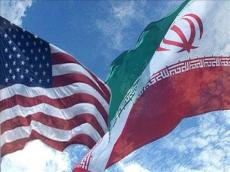|
|
TODAY.AZ / World news
U.S. pushes for harder policy on Iran
29 September 2017 [15:52] - TODAY.AZ

By Azernews
By Kamila Aliyeva
Anti-Iranian rhetoric continues to prevail in the United States as Washington decided to push for harder pressure on the Islamic Republic.
The House of Representatives Foreign Relations Committee of the U.S. Congress approved two bills aimed at toughening sanctions against Iran and the Lebanese Hezbollah movement, RIA Novosti reported.
The first bill provides for amendments to the already existing law on financial sanctions for relations with the Lebanese Shi’ite militant group Hezbollah, which is listed in the U.S. as a terrorist organization, according to the website of the committee.
The amendments specifically tighten the existing sanctions against Iran, which is considered to be the main supporter of Hezbollah movement, according to the committee.
Another bill provides for sanctions for participation or involvement in Hezbollah's actions to use civilians as a ‘human shield’.
After the bill’s entry into force, the U.S. president will have to submit a list of persons who use civilians as human shields and those who help them to the Congress within 120 days.
The long list of U.S. claims to Iran includes support for Hezbollah, Hamas and the Islamic Palestinian Jihad, threats to Israel and stability in the Middle East, support for Syrian authorities and Husit rebels in Yemen as well as developing a ballistic missile program.
Therefore, the U.S. seeks for tougher policy against Iran. The presidential administration was previously instructed to review its policy on Iran, not only looking at Tehran's compliance with the nuclear deal but also its behavior in the region.
Washington insists on inspections of Iran's military facilities by the IAEA (International Atomic Energy Agency) under the Joint Comprehensive Plan of Action (JCPOA), the country's permanent representative to the UN, Nikki Hailey, said while criticizing Russia for allegedly defending Iran.
"If the agreement on Iran has any significance, the parties must have a common understanding of its terms. Iran's officials have already said they refuse to allow inspections to military facilities, even if the IAEA says there should not be any difference between military and non-military facilities. It seems that some countries are trying to protect Iran from large inspections. Without inspections, the deal with Iran is an empty promise," Hailey said.
The Iran nuclear deal was negotiated in July 2015 between Iran, the five permanent members of the United Nations Security Council and Germany. By ratifying the plan, Iran agreed to scale down its nuclear activities in exchange for sanctions relief.
At the same time, the U.S. retains sanctions against Iran on the missile program, human rights and on suspicion that Tehran sponsors terrorism.
URL: http://www.today.az/news/regions/165291.html
 Print version
Print version
Connect with us. Get latest news and updates.
See Also
- 07 January 2026 [23:23]
ChatGPT reduces effectiveness of training - 07 January 2026 [22:25]
Estonia aims to finish Russia border works by 2027 - 07 January 2026 [21:22]
Carry-on-sized supercomputer presented - 07 January 2026 [20:23]
Saudi Arabia opens its capital market to all foreign investors - 07 January 2026 [18:41]
IKEA to close 7 blue-box furniture stores in China - 07 January 2026 [09:00]
UN: US undermined international law in Venezuela - 07 January 2026 [08:00]
Egypt and Syria seal energy cooperation deals - 05 January 2026 [13:02]
Pashinyan backs roadmap for reforms in Armenian Apostolic Church - 05 January 2026 [08:00]
Pakistan Air Force successfully tests indigenously developed Taimoor missile - 05 January 2026 [08:00]
Pakistan Air Force successfully tests indigenously developed Taimoor missile
Most Popular
 Pakistan Air Force successfully tests indigenously developed Taimoor missile
Pakistan Air Force successfully tests indigenously developed Taimoor missile
 China–Europe freight train departs via Middle Corridor, heading to Baku
China–Europe freight train departs via Middle Corridor, heading to Baku
 Kirants as Political lesson: Where Armenian myths end
Kirants as Political lesson: Where Armenian myths end
 Pakistan Air Force successfully tests indigenously developed Taimoor missile
Pakistan Air Force successfully tests indigenously developed Taimoor missile
 Azerbaijan halts meat imports from Lebanon, Lithuania on disease risk
Azerbaijan halts meat imports from Lebanon, Lithuania on disease risk
 Europe increases orders for Azerbaijani gas via TAP
Europe increases orders for Azerbaijani gas via TAP
 Aztelekom expands telecom and internet infrastructure in Garabagh and East Zangazur
Aztelekom expands telecom and internet infrastructure in Garabagh and East Zangazur
